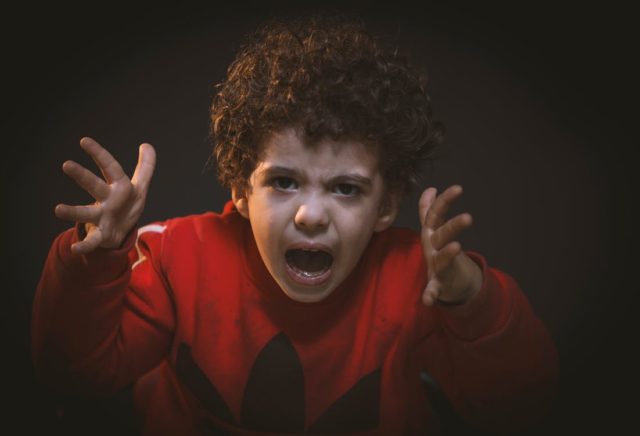
Image Credit: Pexels/Mohamed Abdelgaffar
A few years ago, I took a summer job working at a local school’s childcare program. I was placed with a group of students grades four through eight. I had a great experience, but I will admit it was not easy. Some of the children had me positively pulling out my hair. I’m not alone in this – teachers, parents, and childcare providers across the board are increasingly concerned about children misbehaving.
Mother and journalist Katherine Lewis is one of these. She was so concerned, in fact, that she spent five years trying to find an answer.
The results of her research are compiled in a book titled The Good News About Bad Behavior. Lewis asserts that parents and teachers have been exerting too much control over children, and as a result, they haven’t learned self-discipline. Children misbehave not because they want to, but because no one has taught them the skills they need to control themselves in the first place.
Lewis gives three reasons for this crisis:
1) A Decline in Independent Play
Playtime looks a lot different now than it used to. As education reporter Cory Turner observes:
“Two or three decades ago, children were roaming neighborhoods in mixed-age groups, playing pretty unsupervised or lightly supervised. They were able to resolve disputes, which they had a strong motivation to because they wanted to keep playing. They also planned their time and managed their games. They had a lot of autonomy, which also feeds self-esteem and mental health.”
But playtime these days involves a much higher level of adult supervision and less interaction with other kids. In an interview, Lewis describes what modern kids are missing out on:
“[Kids are] not getting fresh air, they’re not getting exercise, and they’re also not getting social interaction with other kids, which is how children have always learned social skills, including cooperation. It’s also how kids learn impulse control and even abstract thought — when they’re pretending. The most powerful motivation for children to actually control themselves is when they’re playing with other children without adult intervention.”
Without independent play, children lose a valuable opportunity to develop the skills they need for self-development.
2) Growth of Technology and Social Media
The second reason for misbehavior stems from the explosion of technology, which has reshaped childhood with rather negative consequences.
One of these consequences is children’s desires to imitate the famous people they see on TV and social media. As Lewis notes,“Kids are looking to reality TV and YouTube stars to figure out what their goals should be, instead of seeking to understand what truly fills them with purpose.”
3) Decline in Connection
The third major reason children misbehave stems from the decline in connection and community. Lewis says:
“In our overscheduled lives we often don’t have the time to stop and say hello to a neighbor. Whereas in previous generations, our 12-year-old may have been out mowing a neighbor’s lawn, now he’s going from soccer practice to band to tutoring. Kids often don’t have that sense of how they fit in with their community and how they’re contributing.”
How Can We Fix This?
Lewis offers three tips for helping children build the skills they need to control themselves (and to succeed in the long run):
1) Build Connection
Affirming that children need parents who are willing to show them they care by spending time with them, Lewis notes:
“Intentional connection between parent and child — where we’re not half listening, on our phones, or distracted by something else — is simply about giving them our attention. It could even be for 15 minutes at a time when we’re engaged one-on-one in an activity together.”
These activities, Lewis says, build up a strong relationship between the parent and child. And building relationships in good times helps parents and children correct misbehavior more easily when the need arises.
2) Build Communication
Communication plays an essential role in teaching good behavior as well. It paves the way for essential critical thinking and problem-solving skills. However, communication is not a one-way street:
“Communication is not just about adults talking to kids, but listening as well, and really trying to see from their perspective…Or hearing about their problems at school and not jumping in with advice or opinions, but just listening and asking probing questions. This helps them problem-solve and sparks their critical thinking about what the situation might be.
This may seem difficult at times, especially when life gets busy. But there are many ways to communicate with children, even when we’re on a tight schedule and can only take a few seconds to stop, observe, and discuss something they notice in nature.
3) Build Capabilities
According to Lewis, parents should give their children the chance to develop self-regulatory skills—i.e. skills that give them control over themselves. This training is a long process. As Lewis describes, “We start off, when our kids are babies, being in charge of everything. And our goal by the time they’re 18 is to be in charge of nothing — to work ourselves out of the job of being that controlling parent.” Children should build these skills through what Lewis calls the “apprenticeship model,” where children learn the skills they need by watching and imitating their parents and teacher.
These skills have a twofold benefit. First of all, these skills allow children to take responsibility around the house. Having a “job” to perform in the house teaches them about the important role they play in their family. This builds a healthy self-esteem.
Secondly, these skills—especially skills such as managing strong emotions, planning and organizing—give children control over their own behavior. This is beneficial in the short term (when they are able to stop themselves from throwing a tantrum) as well as in the long-term.
Lewis’s advice has helped scores of teachers and parents across the nation. Could the key to helping kids behave really lie, as she claims, not in exerting greater control over them, but in helping them take control of themselves?
 Written by Abigail Herbst and published by Intellectual Takeout ~ August 1, 2018
Written by Abigail Herbst and published by Intellectual Takeout ~ August 1, 2018
 FAIR USE NOTICE: This site contains copyrighted material the use of which has not always been specifically authorized by the copyright owner. We are making such material available in our efforts to advance understanding of environmental, political, human rights, economic, democracy, scientific, and social justice issues, etc. We believe this constitutes a ‘fair use’ of any such copyrighted material as provided for in section 107 of the US Copyright Law. In accordance with Title 17 U. S. C. Section 107, the material on this site is distributed without profit to those who have expressed a prior interest in receiving the included information for research and educational purposes. For more information go to: http://www.law.cornell.edu/uscode/17/107.shtml
FAIR USE NOTICE: This site contains copyrighted material the use of which has not always been specifically authorized by the copyright owner. We are making such material available in our efforts to advance understanding of environmental, political, human rights, economic, democracy, scientific, and social justice issues, etc. We believe this constitutes a ‘fair use’ of any such copyrighted material as provided for in section 107 of the US Copyright Law. In accordance with Title 17 U. S. C. Section 107, the material on this site is distributed without profit to those who have expressed a prior interest in receiving the included information for research and educational purposes. For more information go to: http://www.law.cornell.edu/uscode/17/107.shtml
